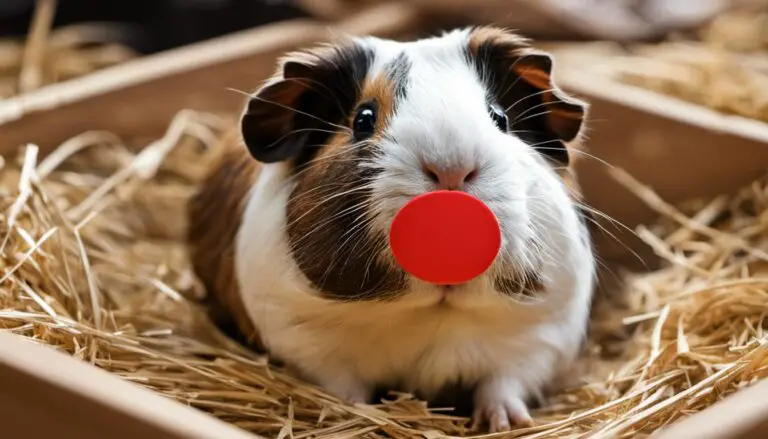How Much Water Do Guinea Pigs Drink A Day: A Quick Guide

How Much Water Do Guinea Pigs Drink A Day? When it comes to our adorable guinea pig friends, staying hydrated is key! So, how much water do guinea pigs drink a day? Well, these little cuties need constant access to fresh drinking water. You can use cold tap water or bottled water, ensuring it’s clean and safe.
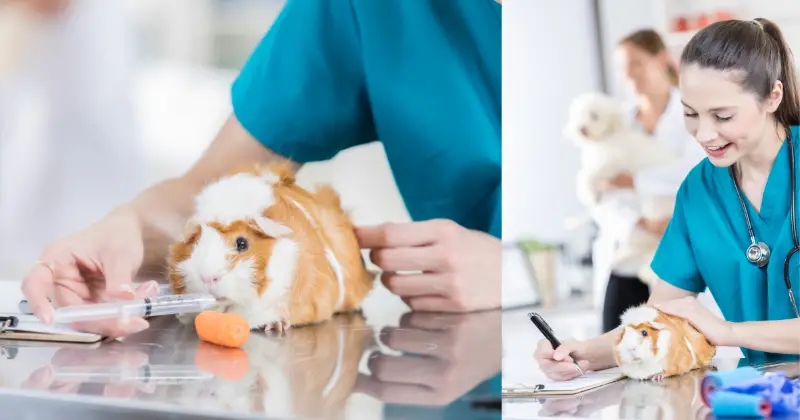
To provide water, a guinea pig water bottle is ideal, ensuring a steady supply of water. It’s essential to monitor the water level and consider using a water filter for extra cleanliness. Guinea pigs can experience dehydration, so keeping an eye on their intake of water is crucial for their well-being.
Contents
Table of Contents
How Much Water Do Guinea Pigs Drink A Day? Ultimate Guide
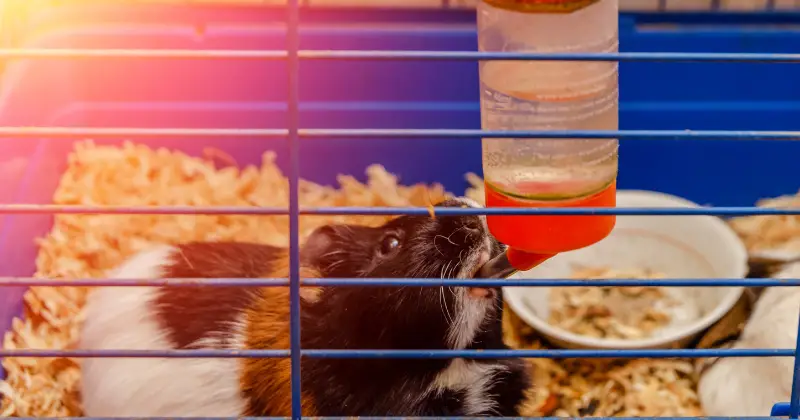
Guinea pigs are charming and lovable little pets, and as responsible owners, we want to ensure they stay healthy and happy. Part of this involves making sure they get proper hydration as this plays a crucial role in their overall well-being. You might wonder, how much water do guinea pigs drink in a day?
On average, guinea pigs should drink around 100-150 ml of water per day. However, this amount can vary based on factors such as their age, diet, activity level, and general health. For instance, guinea pigs fed a diet rich in fluid-packed vegetables might need less additional water.
Additionally, weather changes, humidity, and even pregnancy or lactation can affect their water intake. Regardless of these factors, it’s essential to always provide your guinea pig with fresh and clean water to keep them well-hydrated.
Just keep in mind that, like anything else, too much of a good thing can lead to potential health problems. Monitoring your guinea pig’s water intake will help to prevent issues such as diarrhea and bladder complications, ensuring that they remain comfortable and thriving in your care.
Guinea Pig Water Consumption
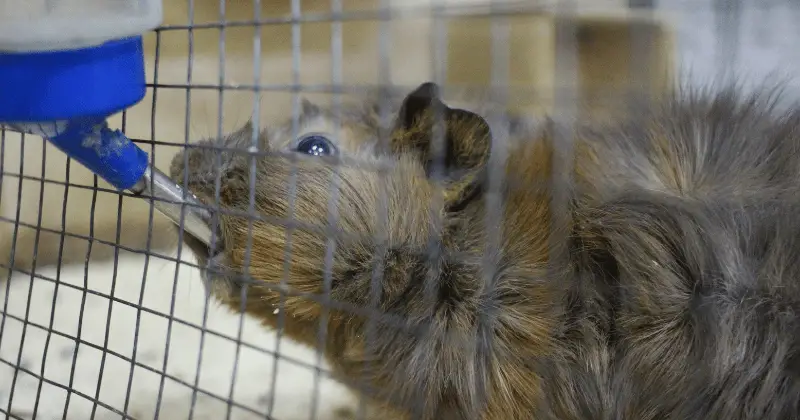
Factors Affecting Water Intake
One aspect to consider when owning a guinea pig is their water consumption. It’s essential to provide fresh, clean water at all times for your guinea pig. However, the amount of water each guinea pig needs can vary depending on their age, size, diet, and other factors such as seasonal changes and exercise.
Younger guinea pigs typically need more water to stay hydrated while they grow. On the other hand, older guinea pigs may require less water due to a decrease in activity levels. Furthermore, guinea pigs that consume more fresh vegetables and fruits may drink less water since they obtain some hydration from their diet.
Normal Water Intake
The average guinea pig drinks about 100-200 ml of water per day, which is approximately 20% of their body weight. However, some guinea pigs might drink between 50-300 ml daily, depending on the individual.
- Age: Young guinea pigs may drink more water than older ones.
- Diet: A diet rich in fresh fruits and vegetables may result in less water consumption.
- Exercise: Active guinea pigs might require more water to stay hydrated.
- Environmental factors: Seasonal changes, temperature, and humidity can affect water intake.
It’s important to monitor your guinea pig’s water intake regularly and consult your vet if there is a significant change in their drinking habits. By understanding your guinea pig’s water consumption needs, you can ensure they stay healthy and happy.
Water Sources and Quality
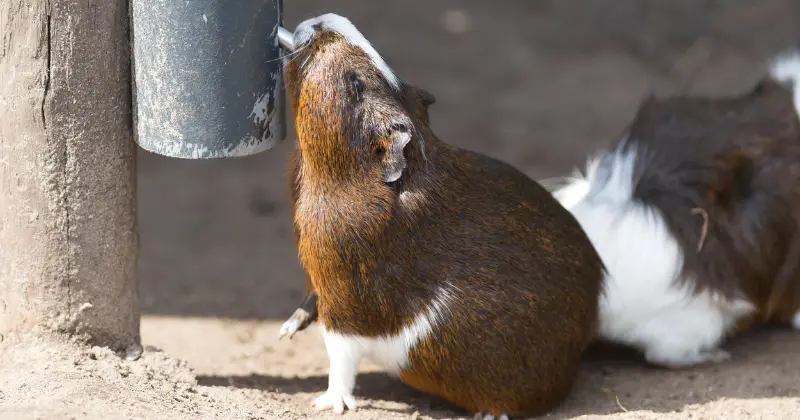
Guinea pigs need a constant supply of fresh water to stay healthy and hydrated. The quality of water you provide to your guinea pig is just as important as the quantity. In this section, we’ll explore various water sources, types of water bottles, and choosing the right option for your pet.
Water Bottle Types
When selecting a water bottle, consider the material, size, and attachment style suitable for your guinea pig’s cage. There are primarily two types:
- Plastic water bottles: These are the most common and affordable option. They’re lightweight, easy to clean, and come in various sizes to suit your guinea pig’s needs. However, bottles made from low-quality plastic may leak or break easily.
- Glass water bottles: More durable and resistant to chewing, glass water bottles are an excellent long-term choice. They’re usually heavier, costlier, and may require special attachments to the cage. Make sure the bottle is secure and won’t fall, potentially injuring your pet.
Whichever type you choose, ensure that it has a no-drip nozzle to prevent water waste and maintain cleanliness in the cage.
Water Bowl Vs. Water Bottle
While both water bowls and water bottles provide hydration to your guinea pig, water bottles are generally considered a better option. Here’s why:
- Cleanliness: Water bottles keep the water fresh and uncontaminated, while water bowls can get dirty quickly due to food, bedding, and waste.
- Ease of use: Guinea pigs may accidentally tip over a water bowl, spilling water and creating a mess. Water bottles are more secure and convenient for both you and your pet.
When it comes to water types, tap water is usually suitable for guinea pigs, as long as it’s safe for human consumption. However, you can also use filtered or distilled water to ensure your pet has access to the highest quality water possible. Always provide fresh water daily and clean the water bottle or bowl regularly to prevent bacterial growth.
Guinea Pig WATER: BOTTLES vs BOWLS | Dripping Bottles | How Much Water? | Bottle CLEANING
Common Issues and Symptoms
Guinea pigs usually drink around 80-100 ml of water every day, depending on factors like their size, diet, age, and activity level. This amount can also be influenced by weather changes, such as humidity and temperature. However, there are some common health issues that may lead to changes in their water consumption.
Dehydration is a concern for guinea pigs, as it can cause lethargy, sunken eyes, and decreased urine output. To prevent dehydration, always ensure your guinea pig has access to fresh water and monitor their intake closely.
Urinary tract infections (UTIs) can cause guinea pigs to drink more water than usual. UTIs may present with symptoms like blood in the urine, frequent urination, or pain while urinating. If you suspect a UTI, consult a vet for proper diagnosis and treatment.
Polydipsia or excessive thirst is a condition that may lead to excessive water consumption in guinea pigs. This could be due to various underlying health issues such as diabetes, kidney failure, or metabolic disorders. If you notice your guinea pig drinking a lot more water than usual, it’s important to consult a vet to rule out any serious health concerns.
Guinea pigs can also experience gastrointestinal problems like ileus, which is caused by gas buildup in their stomach and intestines. This can lead to a lack of appetite and, consequently decreased water intake. If you notice these symptoms in your guinea pig, it’s essential to consult a vet for proper diagnosis and treatment.
Dental issues can also cause guinea pigs to drink more water. Poor oral health, such as overgrown teeth or gum infections, can make it difficult for guinea pigs to eat their food and may result in them compensating with increased water consumption. Regular dental check-ups are essential for maintaining your guinea pig’s overall health.
In summary, if you notice any changes in your guinea pig’s water consumption or any of the mentioned symptoms, it’s crucial to consult a veterinarian. Early detection of health issues can lead to more effective treatment and better outcomes for your pet guinea pig.
Influences on Water Consumption
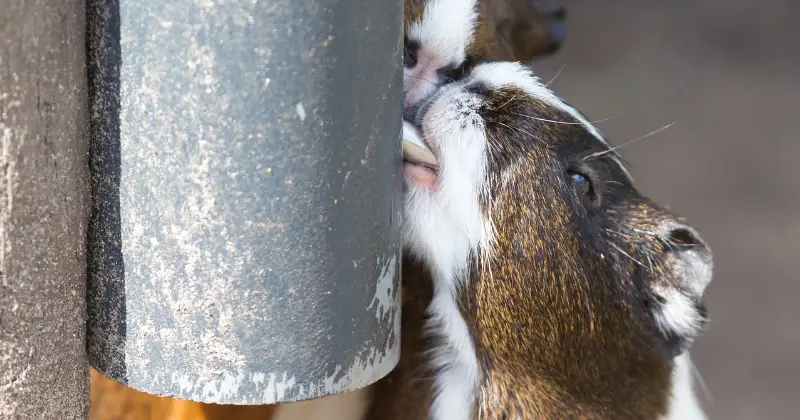
Water consumption in guinea pigs can be influenced by several factors, and it’s important to be aware of them in order to keep your pet healthy and happy. Let’s discuss some of these factors in a casual way.
Firstly, a guinea pig’s diet plays a significant role in their water intake. If they eat a lot of vegetables that are high in water content, they might need to drink less water. On the other hand, if their diet is primarily made up of hay, they may require more water to stay hydrated. A change in diet can also have an impact, so make sure to keep an eye on their water consumption when introducing new foods.
Another aspect that dictates water intake is the mineral content in their diet. For instance, high levels of calcium or salt may make your guinea pig thirstier. Electrolytes and additives present in their food can also contribute to changes in water consumption.
Temperature fluctuation and seasonal changes can be other factors affecting your guinea pig’s water consumption. In hot weather, guinea pigs naturally drink more water to stay hydrated. So, you might see an increase in their water intake during the warmer months.
Lastly, an increase in your guinea pig’s exercise level can lead to them drinking more water. Just like humans, guinea pigs need to rehydrate after physical activity. So, make sure that fresh water is always available for them, especially if they’re getting more exercise than usual.
By being aware of these factors and their influence on your guinea pig’s water intake, you’ll be able to provide the optimal care for your furry friend.
Preventing and Addressing Dehydration
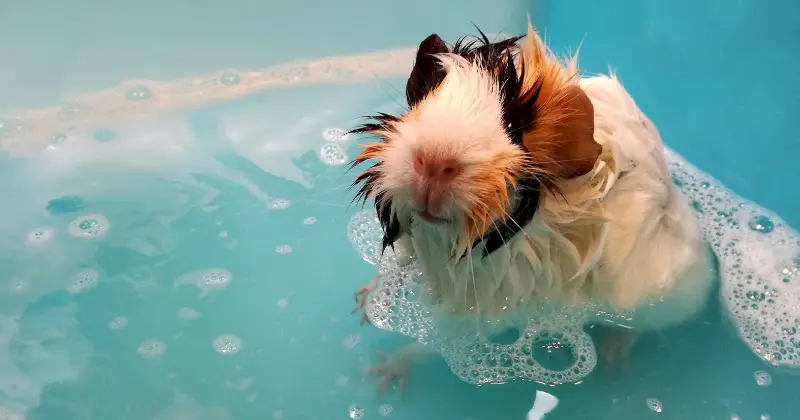
Guinea pigs should drink about 50-300 ml of clean water per day to maintain optimal health. This amount can vary depending on factors like age, size, diet, and climate. Providing them with consistent access to fresh water helps prevent and address dehydration.
To treat dehydration in guinea pigs, it’s essential to recognize the symptoms early on. Symptoms may include lethargy, sunken eyes, poor appetite, and constipation. If you notice any of these signs in your furry friend, make sure to offer them water immediately. Remember, dehydration can quickly become life-threatening if not addressed properly.
One major reason a guinea pig could become dehydrated is overheating. Always ensure their environment is at a comfortable temperature, ideally between 65-75°F (18-24°C). It’s vital to keep their living space out of direct sunlight and provide proper ventilation. A well-ventilated habitat helps prevent health issues like dehydration and heat stroke.
It’s also a good idea to offer water-rich fruits and veggies, like cucumber and bell peppers, which can contribute to the guinea pig’s overall hydration. However, always be cautious about feeding them too many treats, as an unbalanced diet can lead to other health problems.
If you believe your guinea pig might be experiencing severe dehydration or the symptoms don’t improve after several hours, it’s crucial to seek medical attention. A vet can provide more effective treatment for dehydration and ensure your guinea pig receives the care they need.
By keeping a close eye on your guinea pig’s water intake, monitoring their health, and providing a comfortable environment, you can prevent dehydration and keep them happy and healthy.
Additional Factors to Consider
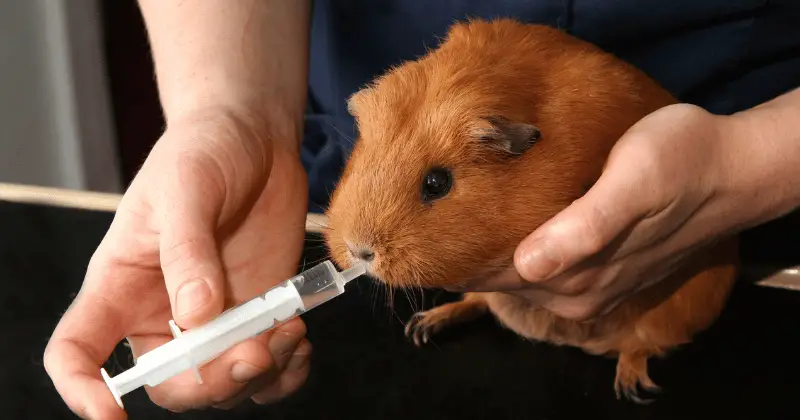
Guinea pigs can consume anywhere between 50ml to over 300ml of water every day, but the amount they drink varies for every individual. There are additional factors to consider when figuring out how much water your guinea pig needs.
Behavior and size play a role in water consumption. Your guinea pig’s age, diet, exercise, and overall health can influence how much water they drink daily. For example, a pregnant or lactating guinea pig may need more water, while an older guinea pig may drink less.
The living environment can also affect their water intake. Guinea pigs may drink more water in a warmer environment, while they may consume less during colder seasons. Ensuring proper ventilation in their space can help maintain a comfortable temperature for them and regulate their water consumption.
Stress can cause changes in your guinea pig’s drinking habits too. Changes in their environment or daily routine may lead to increased or decreased water intake. Monitoring their behavior and making adjustments to reduce stress can help normalize their water consumption.
The type of water bottle you use can also make a difference. There are plastic bottles and glass bottles available for guinea pigs. Some guinea pigs may prefer one over the other, so trying various options and observing their preferences may be helpful.
Finally, the nozzle of the water bottle can make a difference as well. Some guinea pigs may find specific nozzles easier to use, which could affect how much water they drink. Experiment with different nozzle types and materials to find the best fit for your pet.
All these factors play a role in determining how much water your guinea pig consumes daily, so it’s essential to monitor their water intake and make any necessary adjustments. Providing fresh, clean water at all times is crucial for your guinea pig’s health and well-being.
When to Consult a Vet

Sometimes, changes in your guinea pig‘s water intake can signal potential health issues that require veterinary attention. Here are a few scenarios when consulting your vet’s a good idea.
If your guinea pig’s water consumption increases significantly and remains high, it may be experiencing polydipsia. This excessive thirst could be due to various reasons, such as urinary tract infections, kidney issues, or even the onset of diabetes. In such cases, having your pet examined by a vet is critical to identify and address the underlying problem.
On the other hand, if your guinea pig is drinking a lot less water than usual, it might be at risk of dehydration, which can lead to serious health complications. Dehydration can result from gastrointestinal problems, dental issues making it difficult to drink, or a lack of access to clean water.
Don’t hesitate to contact your vet for advice if you notice any signs of dehydration, like sunken eyes or lethargy.
Lastly, remember that some health issues might not directly impact your guinea pig’s water intake but could still warrant a visit to the vet. Keep an eye on your pet’s behavior, appetite, and overall well-being. If you notice any changes or have concerns about their health, it’s always best to consult a professional.
A casual, friendly chat with your vet can help identify potential problems before they become more serious, ensuring that your little buddy stays happy and healthy!
Conclusion: How Much Water Do Guinea Pigs Drink A Day

In conclusion, ensuring an adequate water supply for guinea pigs is crucial to prevent dehydration and maintain their overall health. Signs of dehydration, such as weight loss and decreased activity levels, should be taken seriously as they can lead to more serious health issues like bladder stones and kidney failure.
Guinea pigs require fresh and clean water, and providing them with a hygienic water source, such as a high-quality water bottle or ceramic bowl, is essential. Monitoring their water intake on a daily basis and making adjustments according to weather conditions and their individual needs can help keep them properly hydrated.
It is crucial to provide a guinea pig with lots of water to meet their water requirements, especially during hot weather, as they can become dehydrated within hours without water. Remember, a healthy guinea pig is a happy guinea pig!
FAQs:
What are the symptoms of dehydration in guinea pigs?
Observing the degree of fluids, including subcutaneous and intraosseous fluids, can provide valuable insights into the health issue symptoms experienced by guinea pigs, along with monitoring their food intake, specifically the consumption of fresh veggies that are rich in nutrients.
Dehydration in guinea pigs can cause weight loss, digestive issues, dental problems, and a decrease in energy levels. It is important to monitor their water intake and look out for these signs.
How can I ensure my guinea pig stays hydrated?
Provide your guinea pig with an adequate supply of fresh water in a clean water bottle or ceramic bowl. Monitor their water intake regularly and make sure they have access to water-rich veggies and fruits.
What are the signs of a healthy guinea pig?
A healthy guinea pig will have a good appetite, regular bowel movements, a shiny coat, and be active and alert. It is important to observe any changes in their behavior or appearance as it may indicate an underlying health issue.
Should I be concerned if my guinea pig is not drinking enough water?
Yes, inadequate water intake can lead to dehydration and various health problems. If you notice your guinea pig drinking less water than usual or showing signs of dehydration, it is important to encourage them to drink more water and consult a veterinarian if necessary.
Can I offer other fluids to my guinea pig besides water?
It is generally recommended to provide guinea pigs with fresh water as their main source of hydration. While some fruits and vegetables contain water, they should not replace the need for plain drinking water. Avoid offering sugary or caffeinated drinks, as they can be harmful to guinea pigs.
Please note that it’s important to consult with a veterinarian for specific advice regarding your guinea pig’s health and hydration needs.





